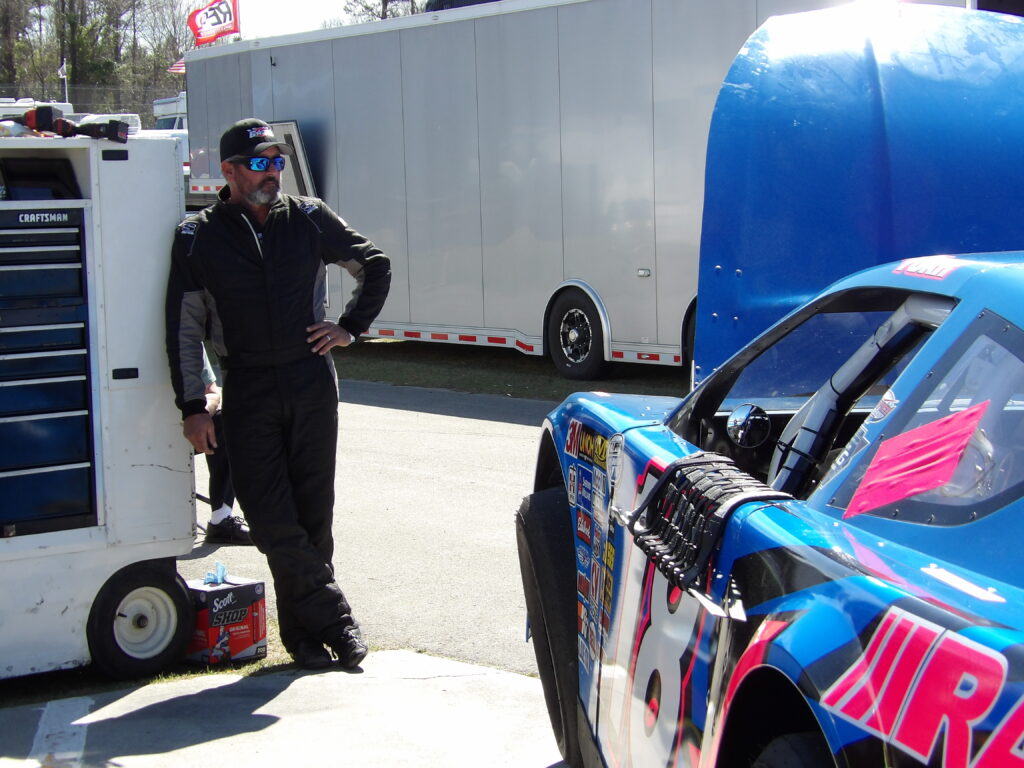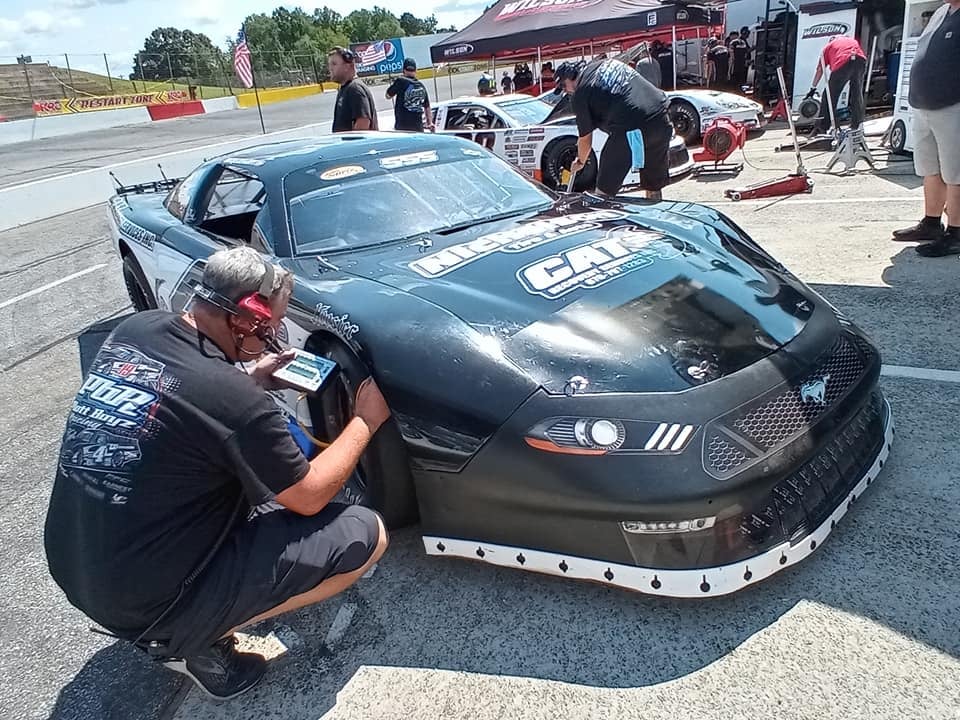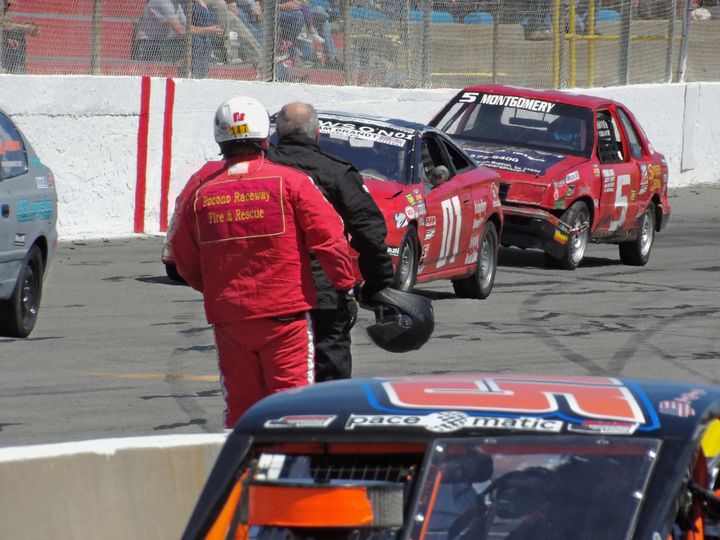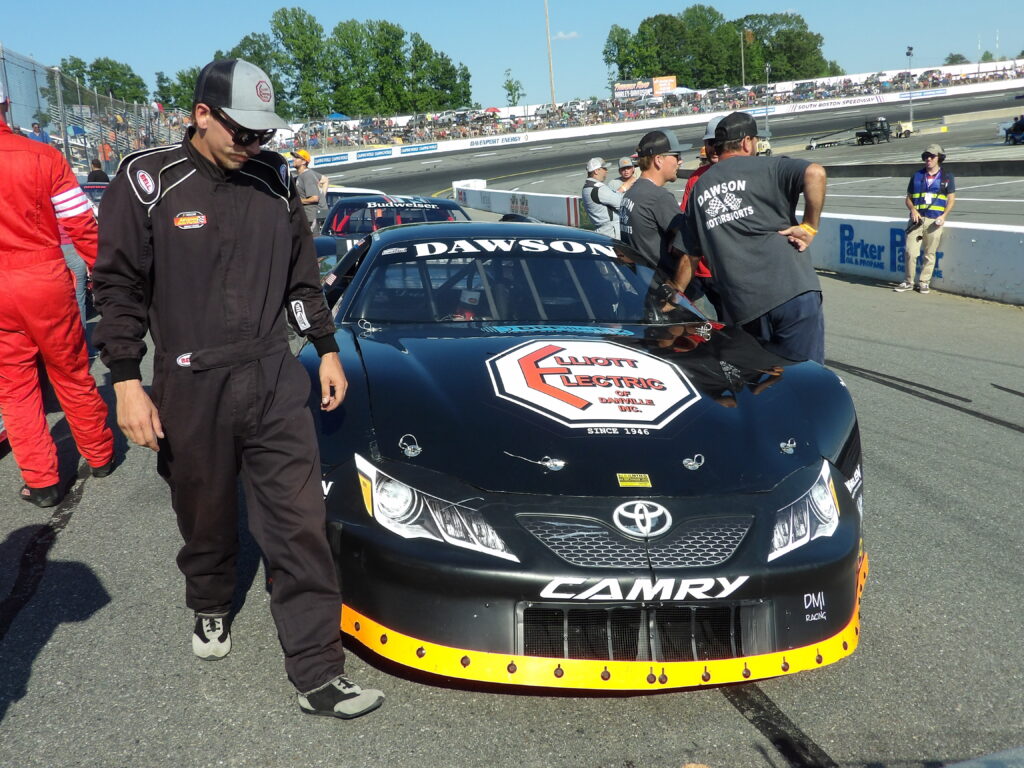
If your path demands you to walk through hell, walk as though you own the place.
unknown
What is it that makes a person give everything they have into, at least financially, a losing proposition. Some would say it’s madness, and some drivers and team members actually would agree. But the real truth is, it’s way more complicated than that, as you would expect any life quest to be. There is so much to this story. Being around racers all my life however, and now with my son getting an up close and personal look at the world of short track stock car racing, we have come to understand what makes these drivers and teams do what they do. But we didn’t just rely on our own understanding through observation, we did as we always do and talked to a number of local short track racing drivers to understand what drives them, especially when it comes to competing in a sport that rarely gives back, at least in the physical reality, what the participants put in. It’s a story we hear about in the circles of stock car racing, but have not seen much of outside of it. And we can report on the races themselves and the stories that come from it for year after year, but the true story of the racers themselves must start to be told. It’s imperative if we want the world outside of stock car racing to understand it. How many times have you heard someone say that stock car racing is just drivers going around in circles? I mean how do you even begin to touch the subject that has that kind of point of view? The stories of individual drivers and autobiographies are numerous, that’s true. And it helps to understand the individual driver and the paths they made in the sport. They’re important for sure. But it’s time to tell the story of the competitors themselves before those that haven’t had an opportunity to become close to the sport understand why it’s so important to some. And for many in today’s age, the story will become more important than ever for many reasons. But even besides all that, the story of stock car racing in America is filled with the blood, sweat, and tears of those who competed in it, not to mention the competitors that sacrificed their very lives to help grow it, or more importantly, just to have been a competitor in the sport itself.




Before we get into what the drivers themselves said about why they do what they do, we have to touch on the sport itself to help you understand. First of all, let’s start with the often overlooked fact that stock car racing IS a sport. Now of course those in the circles of racing understand this, and especially the young and upcoming racer. It’s refreshing to know that the newer generation of stock car racers understand that it is indeed a sport, and are revolutionizing how competitors prepare to compete in it. But still to this day, the casual observer doesn’t seem to get it. As a matter of fact, in the course of researching the cost of playing in any sport, there is one glaring omission. Not one social media search engine mentions the cost of the sport of stock car racing when it gives you totals of what it costs to compete in the many sports it lists. And it says that the average annual spending cost per sport, per child, is around $700. Of course their are variations as every sport’s costs are different. And it lists equestrian sports as the most expensive by a long shot, listing costs as equipment, horse training, riding lessons, and competitive fees. In those cost analysis however is not one mention of stock car racing, and again, some will still argue the fact that stock car racing is not a sport at all. But let’s start with the fact that if it were listed as such, you would see the cost of sports on average rise substantially. And the factual listing that equestrian sports are the most expensive would immediately have a true competitor on cost, sighting the same factors. Equipment, car building and setup, hard earned driving lessons, and competition fees to say the least. But sports costs go beyond the actual monetary setbacks and there’s no bigger truth than that. And in the sport of auto racing, the experiences that mold the mentality of a champion go much deeper than money, but the truth is it takes quite a bit to get there.
Today, many athletes are paying more attention to the sport of auto racing and it’s also these athletes that are changing the minds of their fans to the fact that yes, stock car racing is a legitimate sport. And one that takes more than many other sports to be a true competitor. To be a great athlete takes a certain set of skills. You have to know your goals, master the fundamentals, be consistent, and push your limits. You have to have great reaction time, learn patience, improve your strengths…and all of these athletic attributes are necessities for a successful stock car racer. And added to it and any sport is the inherent risk to your well being. And let’s face it here, the risk to stock car drivers are higher than most other sports combined if we’re talking about substantial injury. Fortunately the risks are being mitigated compared to the risks faced just a few years ago, but those risks are there, and especially for the local short track competitor. And while young and upcoming competitors in most every other sport fall away from competing in it as it becomes clear they won’t make the big leagues, for short track competitors, the sport becomes a way of life, and everyone involved in it becomes family. To me and every other person that gets close enough to the sport learns this quickly, and it’s obvious to those who pay real attention and see realities for what they are that this one fact becomes a hint to how special the sport truly is. I mean let’s face it, how many middle aged men do you see dedicating their lives to competing in football or baseball as more than just a fan of those sports? True you see a few continue to play for the love of it, but not many. Not many at all. But racers will be racers until they die in most cases. And especially for the local short track racer, and even after it becomes clear that their aspirations of being a Cup champion have long come and gone. Ask a short track racer and you’ll find that that probably wasn’t the goal to begin with. So while young football players careers end when they don’t get the scholarship or are drafted into the bigs, racers just keep racing, and many until they just can’t get into the car anymore. And by now it should be clear that they do it at a high monetary cost.

But as I stated, monetary cost may not be the biggest cost the short track racer has to pay. You see, they dedicate their lives to the sport. And you won’t see that kind of dedication in any sport in the world by it’s competitors except for in the upper echelon professional genre by athletes that are paid for that dedication. By that measure, the local short track racer comes up short every time. Even the great stars of the local short track racing venue need sponsorship to break even. And at the point of sounding repetitive, short track racing is a losing venture when it comes to money AND glory. So let’s put that out of the equation. Despite what anyone thinks, no one is getting rich running at your local short tracks, and that’s just a sad fact. So why do they do it? To begin to understand for those that don’t, again we talked to a number of racers and asked them a set of questions that we think will start to help you understand. But even with these answers, in the end we will truly rely on the years of talking to racers to help you know. But first, here are the questions we asked a number of drivers that compete in the sport today. We asked them off the record because we wanted honest answers with no repercussions for them for stating the truth to those who would have issues with the truth as we know many in the world today do. It came down to just three questions for us:
1) How many hours would you say you work on your car per week?
2) Would it be safe to say that you sacrifice a substantial amount of family time as you prepare the car to race and execute the racing schedule you run each year?
3) Why do you race when financial gain is rarely, if ever possible?
The answers of this start to explain it all as they tackle the most important question of what a racer sacrifices to compete. In short, when it comes to question one, the answer may be surprising to some. The number in hours ranged from 10 to 30, but the average fell around 25 hours a week, and it’s important to know that most of these local drivers have obligations and full time jobs to meet those obligations. And in obligations we are talking about family. These are hours outside of family time, already squeezed by the work they do to provide for their families as again, racing very rarely puts food on the table. So that led us to question 2, and the answer was clear except for a very few number that yes, family time is sacrificed, but in an even bigger way than we knew. And that’s even with the family being fully on board with what they are doing in racing. And so we have to say here before we go to question 3 that all of the racing wives and their children have our tremendous respect. Without their support, a local racer really couldn’t do what they do. You’ve probably seen those memes on social media that state that while you sit on the couch watching football or whatever you fill your life to do, a racer is welding, wrenching, and indeed sweating on his race car. But again, we found it to be absolutely true. Racers spend a majority of their spare time getting their cars ready to race, year in and year out. So that brings us to question 3. Why do they do it when financial gain is rarely possible? Their answers became overwhelmingly clear, and we think these 3 quotes can begin to state their mentality:
“It’s a fun thing to do and it’s a CHALLENGE. It’s all in passion.”
Local Limited Sportsman competitor
“I never will do it for the money or the fame. It’s the feeling of peace I get when I strap into that racecar that can never be forgotten or replaced. Racing has been a constant in my life since I was four months old.”
Family team owned CARS Tour Late Model Stock competitor
“The racing community is like no other. It’s a group of people that are fierce competitors but at the same time will help each other out when anything is needed. Many friendships are made that will last a lifetime. Some things you just can’t put a price on.”
Local Limited Sportsman competitor

To note, we talked to drivers from many different classes, but the same themes came up. The challenge, the competition, and surprisingly, PEACE. In a sport where the danger is part of the appeal for the competitor and the fan, it may be surprising that in the drivers’ own words we were hearing that the peace they felt as they strapped into the car was an actual reason they listed. But for us, it was confirmation. You see, the point of this whole article is the fact that the sport itself and the racers that compete in it are special. They had a hard time fully explaining why they do what they do, committing an amazing sacrifice to themselves and their families. But as astute observers, we understood it. Humankind needs challenges and competition is the ultimate challenge. And in the case of the stock car driver, they are willing to take that to the very limit. And that came at the beginning of the sport founded by moonshiners that had a bet on who’s car was faster but fell in love with the challenge of proving it above all else. They were willing to die for it. And in that vein they were joined by World War veterans who needed the ultimate legal challenge that kept them alive inside. And it became the challenge of man over machine, and ultimately man over man, and woman if you will. But it was more than proving who was the best. It was the challenge of taking each other to the limit that they fell in love with, making them rise higher than even they thought they could. There’s a beauty in that. Being all that you can possibly be, and having the respect of those who can take you there.
And it’s time for the part of the racing family that calls themselves fans to fully recognize it. The racing you see at the track starts long before the competition begins, and it evolves in every outing at the track. But more than that even. You are seeing these competitors at their most vulnerable. What you see are a group of competitors that are confident in their craft and it shows to the point of cockiness. But in reality, they are fixing to take a huge risk and they’re exposed in that for all to see. But for them, they’ve given all they can give for that moment. And when they strap in they are at peace with it, secretly hoping that someone will challenge them to the fullest, taking them to the very limits of their ability and beyond. It’s a special moment you should recognize. It’s time to shut down the “keyboard warriors” that marginalize it, and start to promote it yourself for what it truly is. A sport that is more special than most where every moment and every competitor deserves our utmost respect and attention. It’s a sport where even as just a fan, you are considered part of the family. And it’s time that the family comes together and starts to recognize it. The sport of local short track racing is in a special place, not just because of the racers you see today, but because of the racers that came before them. And all of it comes together every weekend at tracks all over the country. The sport is in a state of regrowth despite the many that try to state otherwise, but it is not just the competitors that have managed it that will keep it growing. It is you the short track fan that has immense responsibility. And that all starts with realizing that your local short track racer, their families and their predecessors have went to hell and back to make it happen. They say that social media has been the best and worst thing that has happened to the sport. It’s time as a part of the family that you make sure it becomes one of the best. The sport in our opinion deserves nothing less!




Leave a Reply